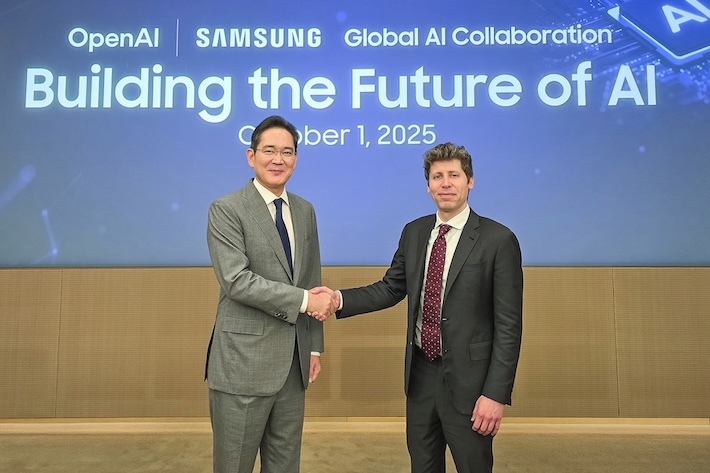South Korea’s top chipmakers Samsung Electronics and SK Hynix will work with OpenAI to build two data centres in the country — a plan the ChatGPT-maker’s chief described as ‘Stargate Korea’ on Wednesday.
“We’re very excited to get to build Stargate Korea and data centers with our wonderful partners to support the sovereign AI needs of Korea,” OpenAI CEO Sam Altman said in a meeting with South Korean President Lee Jae Myung.
Altman met Lee and the chairmen of Samsung Electronics and SK Hynix at the presidential office in central Seoul. Lee reportedly told Altman he was “a paid subscriber of ChatGPT.”
Also on AF: Taiwan Shoots Down US Push For 50-50 Chip Production Deal
Following the meeting the companies also announced they will supply memory chips for OpenAI’s data centres in the US, to meet rising demand from its Stargate project.
South Korea is vying to become Asia’s artificial intelligence hub and has vowed to make investment in the technology a top policy priority. OpenAI set up its first office in Seoul this year following a surge in demand for its ChatGPT service.
South Korea ranks second only to the United States in terms of the number of paying ChatGPT subscribers.
OpenAI plans to set up joint ventures with Samsung and SK Hynix to build the two planned data centres, South Korea’s top presidential adviser, Kim Yong-beom, said. They will have an initial capacity of 20 megawatts.
“Korea is accelerating the expansion of an AI highway initiative, and I expect that the Korean AI ecosystem will develop significantly through collaboration between the our government and OpenAI,” Korean media quoted President Lee as saying.
The presidential office said Google has also been in talks with two to three South Korean companies on AI partnership.
Meanwhile, the SK Group announced in June a 7 trillion won investment, including $4 billion from Amazon Web Services, Amazon’s cloud service provider, to build a data centre in South Korea.
Samsung and SK Hynix together hold about 70% of the global Dynamic Random Access Memory chip market and nearly 80% of the HBM market.
HBM – a type of DRAM standard first produced in 2013 – involves stacking chips vertically to save space and reduce power consumption, helping to process the large volumes of data generated by complex AI applications.
Korea JoongAng Daily reported the partnership with OpenAI has been driven primarily by Samsung Chairman Lee Jae-yong and SK’s chief Chey Tae-won. It reported Samsung’s Lee “personally spoke with Altman by phone” to finalise the deal.
‘Open to financing Stargate’
Presidential adviser Kim also said South Korea was open to participating in financing for the Stargate project in the United States if needed.
“The significant part of the Stargate project would be impossible without memory chips from the two companies,” Kim told a press briefing.
The president’s office said the partnership would give South Korean chipmakers an early foothold in the world’s largest AI infrastructure project, providing a growth opportunity for the domestic chip industry.
It said was seeking to order 900,000 semiconductor wafers in 2029 from the country’s chipmakers. Samsung and SK Hynix have signed letters of intent to supply the memory chips.
Analysts estimated that 900,000 wafers of advanced DRAM chips would be worth more than 100 trillion won ($70 billion) though the figure could vary with memory market cycles.
“Korea has an industrial base like nowhere else in the world that is critical for the development of AI. And so to get to work with such wonderful partners, Samsung and Hynix in many, many ways, but really starting with memory and the needs for that to serve the whole world’s demand for AI,” OpenAI’s Altman added.
Alongside the chip supply agreements, Samsung Electronics’ affiliate Samsung SDS also signed a partnership with OpenAI to develop, build and operate AI data centres under the Stargate project, while also expanding enterprise AI services.
Shipbuilder Samsung Heavy Industries and construction unit Samsung C&T will jointly work with OpenAI to develop floating offshore data centres to cut cooling costs and carbon emissions.
- Reuters, with additional editing and inputs from Vishakha Saxena
Also read:
US Investment Demands Could Spur Financial Crisis: SKorea’s Lee
Seoul Bids to Ease Anger Over Mass Arrests at US Hyundai Plant
Hyundai Raid: How A Visa Loophole Landed Korean Workers In Trouble
Lee Survives White House Test, Trump Keen to Meet Kim Jong Un
S Korea’s Lee Will Try to Pacify Trump With Big Shipbuilding Boost
S Korea to Invest $450bn in US Projects, Energy; Gets 15% Tariff
Tariffs Spur Big Tesla Deals With LGES Batteries, Samsung Chips
S Korea Forms Task Force to Speed up Trade Talks With US
How China Plans To Rival Stargate























